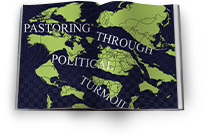Publicly Praying for Government Authorities
You could hear a pin drop. The prayerful silence of our congregation grew even more still as I gave thanks for a politician and her role in maintaining the peace of the church. I then asked God that if she didn’t know Christ, she would come to faith. I also asked that she would remember that on the last day she will give an account not to the Constitution and the law of the land but to the law of God.
After the service, several people approached me to tell me in a hushed voice that the politician was certainly not saved. She was, it turns out, a very public sinner. My understanding is that at least one visiting family never returned because they believe I sinned grievously by even suggesting the possibility of her salvation.
Praying publicly for politicians can be hard. I remember one Sunday I thanked God for the new mayor. Upon saying “amen,” I looked up only to discover that her former opponent had just taken a seat in a nearby pew.
All public prayers have three audiences: God; ourselves (Ps. 42:11); and our listeners, saved and unsaved (Ps. 22:23), including political leaders (Ps. 2:10, Ps. 82).
Even so, almost every Sunday in the pastoral prayer, I pray for a variety of political figures at all levels and branches of government. Because such prayers are fraught with the possibility for offense—and because I feel my own temptations to play the prophet or be unduly political—I often wonder: why bother praying publicly for politicians? There are so many reasons not to do it. But they’re insufficient. Why? Simply put, because God commands it:
- But seek the welfare of the city where I have sent you into exile, and pray to the LORD on its behalf, for in its welfare you will find your welfare” (Jer. 29:7).
- First of all, then, I urge that supplications, prayers, intercessions, and thanksgivings be made for all people, for kings and all who are in high positions, that we may lead a peaceful and quiet life, godly and dignified in every way (1 Tim. 2:1–2).
Both the New Testament (1 Pet. 2:11) and the Old Testament (1 Chron. 29:15, cf. Heb. 11:16) teach that believers are sojourners on earth, exiles from the heavenly Jerusalem. We are to pray “for the welfare of the city” in which we find ourselves. Our temporal welfare—and to a degree our spiritual comfort— are dependent on the political and economic order in which we live.
THE PEACE OF THE CHURCH
Paul not only commanded Timothy to pray for political leaders, he also told him why: “that we may lead a peaceful and quiet life.” We’re commanded to pray for the peaceful conditions that allow the church to gather publicly and individual Christians to live openly as followers of Jesus. These conditions create what I refer to as the “peace of the church.”
This peace can show up in a variety of historical and political circumstances. It’s easy to see in settings where governments recognizes religious freedom, but we should also pray for it—especially pray for it—where governments don’t and would otherwise arrest Christians on account of their faith. To pray for this peace does not commit believers to political systems, parties, or candidates. It requires simply that we pray.
Further, we are to make “supplications, prayers, intercessions, and thanksgivings . . . for all people, for kings and all who are in high positions.” In supplications, intercessions, and thanksgivings we find the importance of shared welfare. We want to pray so that if the politician (or that politician’s opponent) were listening, he or she would recognize how it benefits everyone (Eccl. 10:20). Part of the way we recognize our common welfare is by identifying how God is using authorities for our good.
Thus, Paul can complement King Agrippa on his familiarity “with all the customs and controversies of the Jews” (Acts 26:3). We can also assume that Paul found reason to give thanks even for Nero. The emperor’s resumé included matricide, incest, gay marriage to the surgically transitioned “female” Sporus, megalomania, devaluation of currency, and claims to deity. He was also a failed pop and sports entertainer. Nero either personally or through proxy was responsible for Paul’s martyrdom. And yet Paul charged Timothy to give thanks even for Nero.
Believers should never thank God for wickedness. Rather, we should thank him for his good purposes in sovereignly governing such sin. Paul could have thanked God for Nero’s beautification of the city of Rome, his introduction of fire safety standards for buildings in the capital, the continuation of the peace of Rome, the blessings of Roman citizenship (see Acts 25:25), and the internationalization of the Empire allowing for the spread of the gospel through the world (see Col. 1:6). Both Peter (1 Pet. 2:13–14) and Paul command us to find reason to give thanks for all political leaders.
POLITICAL PRUDENCE IN PRAYER
In the Old Covenant, God’s people were created to function within a system of government regulated by God’s word and within specific geographic boundaries. The nation of Israel could not fully obey the law outside of the Promised Land (Ps. 105:44–45). New Testament church polity, however, is designed to function under all forms of government. The church can gather and worship at almost all levels of religious freedom.
Crafting a pastoral prayer for political leaders, then, must take into account current political conditions. The peace of the church enjoyed in the United States allows me to pray for the salvation and conversion of politicians, and reform in the judiciary and law enforcement. It allows me to petition for national revival, and for Christians to vote according to biblical principles. I can give thanks for pro-life politicians, for those who support Judeo-Christian morality, and for politicians with testimonies of being born again.
These freedoms are taken for granted. They’re not open to all Christians. In places where the peace of the church is more fragile or even non-existent, the pastor must approach public prayer for those in authority with greater care. We don’t know the exact petitions that Ezra and his contemporaries used to obey King Darius’ command to pray for “the life of the king and his sons” (Ezra 6:10). But we can assume that the content of their prayers didn’t appear threatening or politically destabilizing to the king or his informants.
That’s not to say that public prayer should be animated by servile fear before the state, nor grant any ground to a government who would declare itself sovereign over Christ or slow the spread or clarity of the gospel, as some national parties would have it.
Still, “this is the will of God, that by doing good you should put to silence the ignorance of foolish people” (1 Pet. 2:15). Believers should publicly do good so as to overthrow false and negative stereotypes.
PRACTICAL CONSIDERATIONS
If your church has never prayed for politicians, then perhaps teach your people the practice before starting. In the churches I’ve served, a brief word on 1 Timothy 2 prior to your first prayer would be enough. At the very least, include this verse in your prayer: “Lord, you tell us in your Word to intercede for kings and all who are in high positions, that we may lead peaceful and quiet lives. And so we pray for Mayor Jones . . .”
In the United States we have a federal system comprised of municipalities, county/parish, state, and federal levels. I personally view voters as authorities and pray for them corporately before elections. Each level of government has both elected and unelected officials, and in general I pray for elected officers by name and the other authorities by office. This allows me to pray for teachers, law enforcement, the military and their chaplains, civil servants, and the judiciary. You may find it a helpful exercise to list all elected officials voted on by the members of your congregation and pray for them on successive Sundays.
Praying for authorities can accomplish a lot of good in your church. First and foremost, it demonstrates obedience to God.
It sensitizes us to how God uses such men and women for his good and wise purposes.
It allows pastors to exhibit care for the shared welfare of the church and state officials.
It provides pastors the opportunity to remind congregations of their civic responsibilities.
It models for others how to pray about complicated topics, which is useful for both family worship and other public prayer meetings.
Lastly, it offers you a winsome bridge to the gospel should you ever meet with those whom you’ve prayed for. You can tell them of the many times your congregation has given thanks for them and interceded before the throne of God on their behalf. As Paul reminds us, the Lord “desires all people to be saved and to come to the knowledge of the truth (1 Tim. 2:4), and that would have been true of even Nero.









